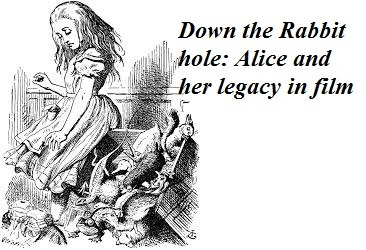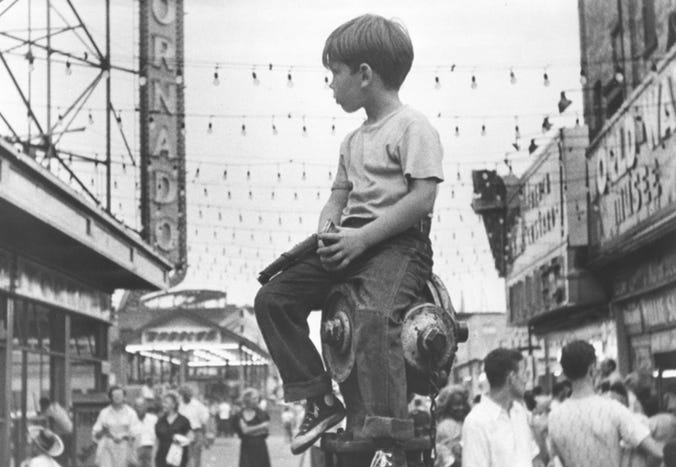

I am waiting for Alice in Wonderland, to retransmit to me, her total dream of innocence- Lawrence Ferlinghetti, I am waiting, from the poetry collection A Coney Island of the Mind (1958)
SPOILERS (NOT THAT THERE'S MUCH OF A PLOT ANYWAY...)
NEXT WEEK: Zazie Dans Le Metro (1960)
New York dwelling 12 year old Lennie is sick of babysitting his 7 year old younger brother, Joey. After a family incident leaves them alone for the day, Lennie devises a cruel prank on his brother. A frightened Joey runs away and seeks solace in the Wonderland of corney island.
This is probably the most obscure film I've looked at so far. I'd never heard of it before viewing. The fact I'm from the UK and not from the US perhaps didn't help on that matter. This is one film which is strictly US centric. The only way you would be familiar with this work is if you are a film student (presumably from the US) or a film academic. I am neither, and I must confess the idea of looking at this daunted me.

The reason why Little Fugitive is a staple of US film academia is because it was one of the first films to utilize hand-held camera and nonprofessional actors. Its direcing team, Morris Engel and Ruth Orkin, are considered pioneers of the form, and pushers of cinema as art. This method (particularly the long, drawn out sequences of Joey on the rides at corney island) would later influence the critically lauded French New Wave in Europe. The film also captures the ideal of a "perfect" 1950s new York in which no harm comes to anyone (although anyone with an idea of history knows this wasn't exactly the case)
So we know its historical importance, but why am I covering this here, in a carrollian space?
This film was one of 15 to be chosen for ACMI's 2018 Alice is Everywhere film festival. The festival had a range of films covering carroll-esque narratives, from the obvious to the subtle. Little Fugitive fits on the extremely subtle end of the scale. If you don't go looking for Carroll, you really won't find it.
And yet there are some parallels.
But her sister sat still just as she left her, leaning her head on her hand, watching the setting sun, and thinking of little Alice and all her wonderful Adventures.Lennie and Joey's fraught sibling relationship has something of Alice and her sister's in it. Both pieces feature a seven year old sibling and a much older brother or sister. In both tales one sibling drives the other to seek solace in a place of unfamiliarity. Alice dreams of Wonderland due to her sister's book being uninteresting and the day being too hot, Joey runs away to corney island because of his brother's actions.


Alice had begun with `Let's pretend we're kings and queens;' and her sister, who liked being very exact, had argued that they couldn't, because there were only two of themBeforehand, Lennie makes it clear he considers Joey a liability. In Through the Looking-Glass it is hinted that Alice's sister is exasperated with Alice's pretend games. Just like Joey's wish to go to Corney island, Alice's second curious dream (of looking glass world) is also partly stemmed from an argument.

Once Joey runs away, like Alice, he is a child lost in an alien environment. Free of any parental guidance and siblings he explores every nook and cranny of Corney island. For Joey, corney island is just as weird and fabulous as imagined dream worlds are to Alice.
but, oh dear!’ cried Alice, with a sudden burst of tears, `I do wish they WOULD put their heads down! I am so VERY tired of being all alone here!’Joey begins to miss home after being reminded of Lennie's harmonica. Similarly Alice becomes homesick after remembering her cat Dinah and going through one strange situation too many. Alice's experiences of Wonderland sour more quickly than Joey's experiences of Corney island, although both get tired or exasperated in their adventures.
Whilst the narrative in little fugitive is resolved quickly via Lennie finding Joey. In both Wonderland and Looking Glass World there is technically no one to find Alice (until she awakens, that is). In Wonderland she finds this idea a worry, whereas in Looking Glass World she finds it more of a liberating joy.
Overall Little Fugitive is a interesting curio and snapshot of 1950s new York. It is however one with is perhaps best suited to scholars and film students. Some may find its long corney island scenes and lack of dialogue frustrating. Although it works well as a historical document, I question how well it works as a film without its context.
NOTES:
- Watch the film in full here.
- Interesting analysis from take one.
- Another interesting essay is by cinephilecity.
- This film is permanently in the archives of MOMA museum in the US and is occasionally screened there.